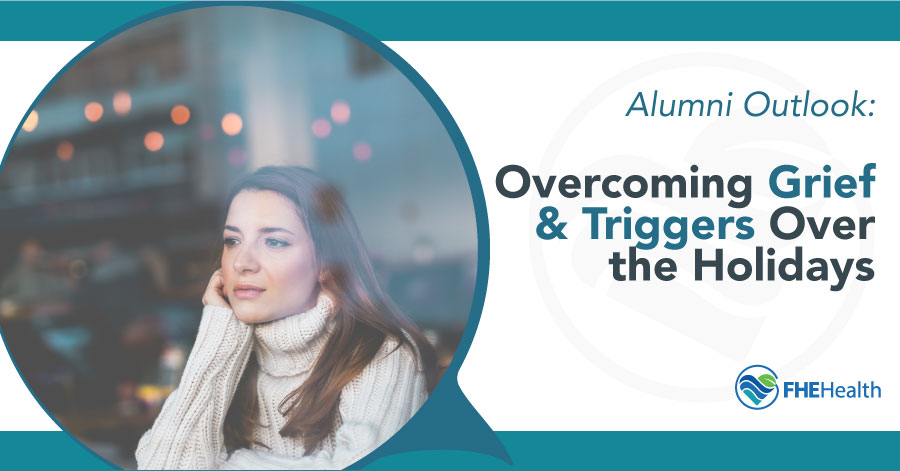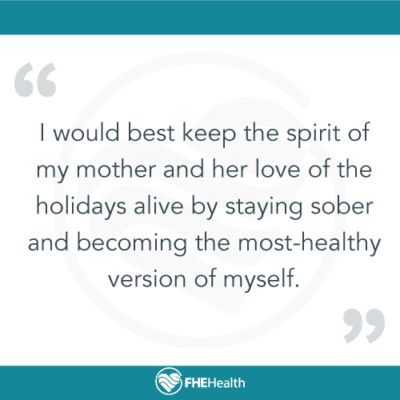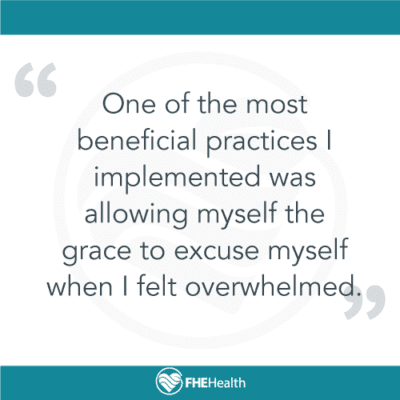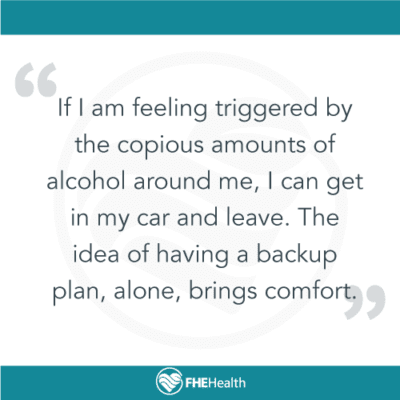
There is no doubt that the holiday season is a favorite time of year for many people. Glistening lights garner undivided attention and ease the stressors of the hustle and bustle of the holidays. Rosy cheeks, illuminated by a comforting fire, snuggle up on the couch and indulge in the laughter creating the perfect ambiance of the season.
For others, like me, this time of year can resurface remnants of grief, trauma, and overall triggering emotions. The twinkle of lights blurry as tears fill my face and the fireplace doesn’t fill the void of the absence of my mother.
Many of us have lost loved ones and the holidays can be a difficult time to try and cope. We may find ourselves longing for the days – especially the holidays – when they were around. Whether good or bad, we like to stay in the memories, pondering what the holidays would be like if they were still here.
The First Christmas: What It Was Like
 The holidays have been a particularly difficult time for me, ever since the holiday when my mom got sick. I can vividly remember her lethargic and less than joyful mood as Christmas approached. The doctors tested her, and she had the flu and bronchitis. I remember tears flooding her face when she didn’t have the strength to participate in our annual Christmas breakfast at Mama’s house. What we thought to be a horrible seasonal sickness turned into the warning signs of her future fatal heart attack.
The holidays have been a particularly difficult time for me, ever since the holiday when my mom got sick. I can vividly remember her lethargic and less than joyful mood as Christmas approached. The doctors tested her, and she had the flu and bronchitis. I remember tears flooding her face when she didn’t have the strength to participate in our annual Christmas breakfast at Mama’s house. What we thought to be a horrible seasonal sickness turned into the warning signs of her future fatal heart attack.
These memories continue to burn through my brain every year as the holidays approach. My first Christmas without my mother, I remember getting absolutely intoxicated and attempting to drown out her memory. Consecutive years of this type of avoidance ultimately led to the unmanageability that landed me at FHE Health in South Florida.
My first Christmas, in sobriety, was extremely overwhelming. Not only was I a total newcomer, a few months out of rehab, but my son was in Texas with father and my mom still wasn’t here. All of the traditional holiday festivities were dimmed by the new scenery and new life I created to ensure my sobriety. I longed to be home, in Atlanta, with my family. Truth be told, part of me longed to be home so I could call up the familiar drug dealer and get my fix to make it through the grueling holidays.
 I was living at my aunt’s house and the holidays spent with an Italian family means at least 50 people in attendance, gluttony, loud theatrical interactions, and alcohol. I wasn’t really concerned with trying to sneak in a few drinks because my family was well aware that I was “fresh out of rehab”. I was consumed with catching everyone up on my life and avoiding dropping any hints that I was emotionally struggling.
I was living at my aunt’s house and the holidays spent with an Italian family means at least 50 people in attendance, gluttony, loud theatrical interactions, and alcohol. I wasn’t really concerned with trying to sneak in a few drinks because my family was well aware that I was “fresh out of rehab”. I was consumed with catching everyone up on my life and avoiding dropping any hints that I was emotionally struggling.
It wasn’t until I the end of every family function, when I was alone with myself, that I truly began feeling the magnitude of the grief. It was the moment that the laughter and loud roar of family members silenced that I began to obsess over how I could get outside of myself. I dreamt of the warmth of indulging in my substance of choice wrapping around me like a warm blanket. Hopeless thoughts of never seeing my mother again were accompanied by a state of utter powerlessness. This theme continued on for another year until finally, I was in enough pain that I decided I had to change.
Merry, Healthy, and Bright: What it’s Like Now
Once my son came to live with me, I could no longer avoid the looming feelings of grief. I knew that left to my own devices, I would relapse. I began to ask for help. I talked with my sponsor about how much I truly despise the holidays without my mother. We talked about the guilt I felt about my Scrooge-like attitude concerning the holidays and inventoried my feelings of inadequacy as a mother. I remember my sponsor gracefully explaining to me that I had to create new memories for the holidays. She explained that this meant walking through my grief and embracing my true feelings to my innermost self. In other words, I would best keep the spirit of my mother and her love of the holidays alive by staying sober and becoming the most-healthy version of myself.
 I began to implement some self-care techniques that relinquished my desire to drink/drug to avoid the feelings I felt.
I began to implement some self-care techniques that relinquished my desire to drink/drug to avoid the feelings I felt.
I created an exit strategy. One of the most beneficial practices I implemented was allowing myself the grace to excuse myself when I felt overwhelmed. Today, I drive separately to family gatherings to ensure I have a way to leave the event when the feelings of grief crop up. If I am feeling triggered by the copious amounts of alcohol around me, I can get in my car and leave. The idea of having a backup plan, alone, brings comfort.
I no longer apologize for how I feel. My alcoholism is cunning and loves to position me to be the perfect victim. When I begin to feel guilty for my grief I am in the perfect position to be the victim and pursue a drink to ease me of the symptoms. Sometimes, I can be emotionally fragile during the holiday season and my loved ones support and understand why. Anytime I apologize for being upset, I am sending the message to myself that I am doing something wrong.
I stay connected to my sober support. One of the most important aspects of staying sober through my grief and the approaching holiday season is to stay connected to my sober support. After all, no one in the world truly understands me and the way my brain operates like another alcoholic. We have walked through the trenches together, literally been to hell and back. Even on the most painful of days, I find solace in staying connected to the women that understand my perilous path and encourage me to stay in the moment and stay sober.






